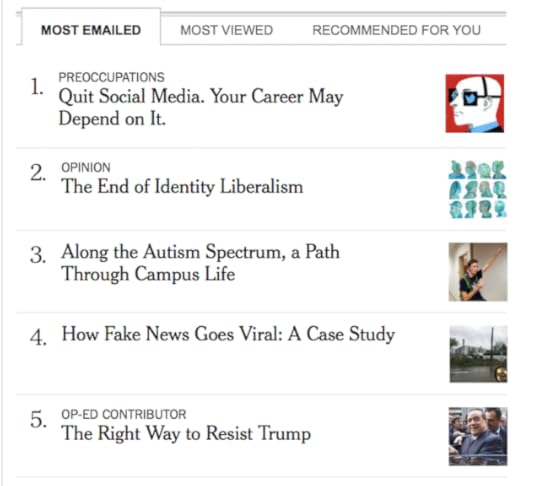What I’m Talking About When I Talk About Social Media

My Curmudgeonly Musings Go National
On Sunday, I published an op-ed in the New York Times arguing that social media can cause more harm than good for your career.
The core of my argument is that the professional benefits of social media are being overemphasized (I don’t buy this idea that suddenly Twitter and Facebook are the main channels through which talent is recognized and opportunities spread), while the professional costs of social media are being underemphasized (see: Deep Work).
As indicated in the above screenshot, this generated some discussion.
Of the different reactions that made it onto my radar, the one I found most interesting was the question of how to define “social media” in the context of these types of cost/benefits analyses. (See, for example, the thoughtful self-analysis in this Hacker News thread.)
I think it’s worth me taking the time to clarify my thinking on this issue.
Engineered Addiction
When I’m speaking negatively about “social media,” I’m almost always referring to the major services offered by the major attention economy conglomerates; Twitter, Facebook, etc.
These companies, like any media company, harvest your time and attention and transform it into revenue. This is a lucrative industry, so they invest a large amount of resources into making their services as addictive as possible.
The ideal use case for these companies is that you return persistently to their services throughout most of your waking hours (c.f., Jim Clark talking about a social media panel where a panelist was raving about the growing number of users spending 12+ hours a day on Facebook).
Contrary to some recent strains of thinking, I don’t think these companies are doing anything unethical, much in the same way I wouldn’t condemn a television network for trying to produce the most watchable possible programming.
But a side effect of this addictiveness is that it can cripple your ability to perform deep work, which, as you know, I think could have disastrous consequences for both your professional success and personal fulfillment.
This definition of “social media” is quite narrow. It doesn’t include, for example, individual blogs, or discussion forums, or homegrown sites like Hacker News — as these services haven’t been massively optimized to colonize our cognitive landscape.
I know many people who are dismayed about how much time they spend checking Facebook, but (to my secret disappointment) I’ve never met someone whose claimed the same about Study Hacks.
In other words: I like the Internet and I like its potential to connect, energize, and inform people (while also recognizing, of course, its scary potential to misinform and divide on a mass scale). But I’m wary of the small number of services that have conquered our culture by claiming to be synonymous with these goals while in reality plotting to squeeze every last cent of value out of our scarce attention.
(For an interesting take on this general topic, see Douglas Rushkoff’s excellent Throwing Rocks at the Google Bus, which argues that homegrown, peer-to-peer style services are the key to the Internet living up to its full potential.)
Cal Newport's Blog
- Cal Newport's profile
- 9947 followers



